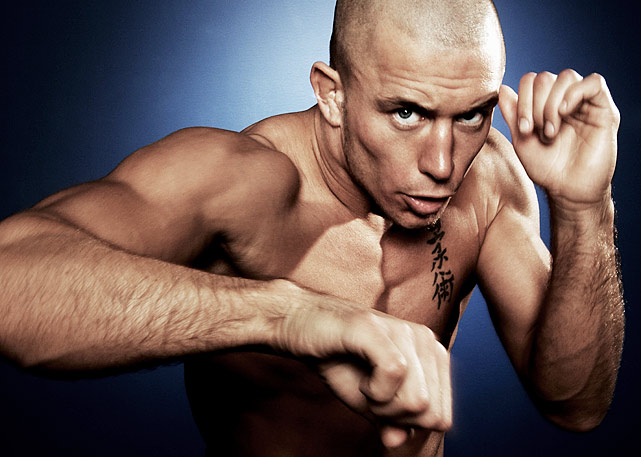
You likely have and will continue to read and watch a lot about Georges St. Pierre's sudden criticism of the UFC as well as his employers' responses. St. Pierre recently told Canadian media members that a big factor in his deciding to take a leave of absence from fighting was the UFC's less than enthusiastic response to his wanting extra drug testing for his fight late last year against Johny Hendricks.
St. Pierre said he wanted to help a sport with a serious drug problem. St. Pierre also said the UFC is a monopoly.
UFC co-owner Lorenzo Fertitta has said he is disappointed with St. Pierre's public complaints and allegations, and that the long-time champ has never expressed them to him personally. Wednesday, after UFC Fight Night 35, UFC president Dana White blasted St. Pierre for calling the UFC a monopoly and said he believed St. Pierre is simply mad at him for saying that he believed Hendricks deserved to win their controversial UFC 167 fight.
Both St. Pierre and White have said things that are untrue or silly. However, a topic of real substance is being overlooked.
First, the untrue and silly statements from both sides.
The UFC as a Monopoly
"This is a relatively new sport. There's one organization that has a monopoly," St. Pierre said of the UFC.
The UFC is not a monopoly. That term has an actual definition based on, you know, the dictionary and case law. As White pointed out, Viacom is a main competitor of the UFC's right now to say nothing of the the large Asian ONE FC promotion and the several other American promotions who currently have national television deals.
"Viacom is our competitor," White said.
"They have a $40 billion market cap. I'm never going to see $40 billion as long as I live. So we're not a monopoly either."
The UFC has also in the past competed with billion dollar valued publicly traded promotions (IFL) as well as promotions (EliteXC) who beat the UFC to network television and drew better ratings than the UFC.
GSP's war on drugs
St. Pierre's claim that he was trying to help the sport on the whole by insisting on VADA testing is as silly as it is new. Clearly, it was a legacy-preserving, late-career reaction to repeated allegations from trash-talking opponents over the years.
Opponents like BJ Penn, Nick Diaz and Johny Hendricks have done everything from insinuate that St. Pierre uses steroids to outright accusing him of it.
St. Pierre decided to go on the offensive so as to beat back those rumors and allegations. That was his right but if he truly wants to help increase drug testing for the sport as a whole, as he now claims he tried to do, he could start a fund to augment the paltry Nevada State Athletic Commission budget so that they can do increased year-round random testing of athletes now that he is no longer a competitor himself. At the least, he could help raise awareness of this issue.
St. Pierre's sudden sanctimoniousness regarding drug testing is unconvincing as altruism.
Dana White was also wrong when he seemed to say St. Pierre did not go through the VADA testing himself.
"The athletic commission was involved in this whole thing, tried to make it happen, and at the end of the day, Georges St. Pierre ended up not doing it," White said.
Well, it is true that the NSAC was brought in to try and oversee a negotiation between the St. Pierre and Hendricks camps for additional WADA-guideline testing and that didn't work out when the fighters' reps could not agree on how things would go down. St. Pierre, however, did go through with the VADA testing for himself. That should be mentioned.
So should the fact that the test results are not worth the paper they're printed on because of the fact that St. Pierre paid for the testing. VADA was hired by St. Pierre to test him to prove he was clean. What are the chances those results would ever come back positive for the man who commissioned them?
White was charitable in describing the whole enterprise as a bit weird. In reality, whatever St. Pierre's intentions, the VADA testing process was entirely illegitimate and so ultimately not useful to improving whatever drug problem may exist in MMA.
The real issue - alleged fighter intimidation by the UFC
A small piece of St. Pierre's statements to the Canadian press has been largely ignored up to this point. After incorrectly labeling the UFC a monopoly, St. Pierre said something very interesting.
"Fighters don't have much power," St. Pierre claimed.
"They can't really talk because if one says what he thinks, he will get punished."
If St. Pierre has, in fact, observed the UFC punishing fighters on their roster for speaking out in legitimate ways, he should talk more about that.
St. Pierre may have finally realized that he is in a position of relative independence from the UFC and so he can speak his mind freely. If St. Pierre has the guts to flesh out the ways in which he has observed the UFC unfairly intimidate its fighters, he could shine a useful light on a classic workplace problem in the world's top fight promotion.
UFC president Dana White is known as a business man who keeps his word. His integrity , in that regard, has always seemed to be intact. It would not surprise many people, however, if it turned out that the strong-willed and quick-tempered executive also uses intimidation to keep fighters in line.
St. Pierre has started talking about something pretty important, and it isn't performance-enhancing drugs in MMA. If GSP has something to say, he should speak up a bit, give more details and then we should all listen.
Follow Elias on Twitter @EliasCepeda & @YahooCagewriter